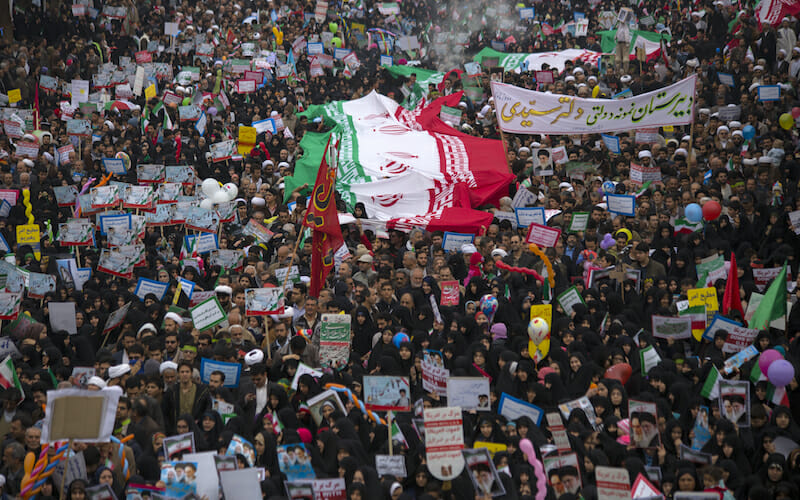
Iran’s Woes: America Can Actually “Do a Damn Thing”
During the tumultuous days of Iran’s revolution in 1979, the leader, the late Ayatollah Ruhollah Khomeini, used a statement in reference to the perceived United States intervention in Iranian affairs by saying that “America cannot do a damn thing.”
Iran’s revolution was hugely anti-Western and the height of its antagonism to the West was reflected in the takeover of the U.S. Embassy in Tehran on 4 November 1979, in what came to be known as the Iran hostage crisis, and laid the groundwork for the severing of bilateral ties between Tehran and Washington.
The “revolutionary” Iranians believed that the sovereignty and independence of the nation was compromised under King Mohammad Reza Pahlavi, who was a pro-U.S. leader and they set in motion the movement to end American influence and win independence for the nation. Even one of the famous yet bizarre reforms introduced during those days was that shops and malls were told to remove English-language scripts from their façade and promotional materials. It is not the case today and English texts are everywhere on the streets, shops, malls, TV, books and clothes. Learning English, aside from being an academic requirement, has turned into a demonstration of eruditeness and knowledgeability among youth, and a “prestige” thing. Parents who want to ensure their children have smooth intellectual progress, send them to English language training classes.
Iran’s revolution won hearts and minds with many big promises, the majority of which have not been translated into action four decades after those boiling and exciting days. The country’s economy is literally derelict and protests by businessmen, tradesmen, drivers, shopkeepers, academicians, environmental activists and journalists have soared following the withdrawal of the United States from the Iran nuclear deal. With the unusual devaluation of the national currency, the Rial, hyperinflation and the skyrocketing increase of the price of gold and a rising exchange rate means Iran is experiencing difficult and taxing days.
Moreover, strikes and nationwide demonstrations by the owners of enterprises, industries and even truck drivers send the message that even the moderate, pro-reform government of President Hassan Rouhani has been unable to deliver on his promises and introduce stability to the society through constructive engagement with the world and address the nation’s economic difficulties, let alone his political promises including freeing political prisoners.
Widespread mismanagement and corruption of government officials aside, the big portion of the economic woes of Iran originate from the sanctions that the United States has imposed on the country over its nuclear program and regional policies, and most importantly, its withdrawal from the Joint Comprehensive Plan of Action, which makes international trade and business with an already isolated Iran more difficult. So, although Iranian officials and authorities continue sending warnings and use aggressive rhetoric against the United States, repeating the same statement that the founder of the revolution invented, it seems that America can actually do a damn thing, which is to turn its adversary into a pariah state.
Iran is a developing nation with a young population, but the situation of the country won’t get better unless its leaders come to realize that prolonged animosity with the United States, sending threats to Israel and refusing to interact and work with the international community on areas of concern won’t do them any good and will make the public even more pessimistic about the days to come.
These days, even taxi drivers and people at baker’s queues discuss nuclear politics, foreign relations and the deterioration of Iran’s economy, whether they are experts or not, because they seem to believe their lives are affected adversely.
The nuclear burden
The majority of economic sanctions that have targeted Iran have to do with its ambitious yet hopeless nuclear program. For several years, under President Mahmoud Ahmadinejad, Iran refused to negotiate with world powers, even though there were sporadic and disorganized talks which didn’t produce any useful and promising outcome due to the cluelessness of Ahmadinejad’s negotiators about the basics of diplomacy. Furthermore, there were underground negotiations between Iran and the United States under Ahmadinejad, which for unknown reasons were kept secret from the public for some time – the reasons, however, can be surmised: negotiations with a “hostile state” were deemed to be a sign of submitting to the prowess of the other side and Ahmadinejad’s people, while furtively talking to Americans, constantly denied the rumors that they had negotiated with their U.S. counterparts. There were even reports that Ahmadinejad had once implored then Swiss President Hans-Rudolf Merz to make it possible for him to negotiate with Barack Obama. The Swiss represent U.S. interests in Iran.
Iran currently doesn’t have any nuclear weapons. Data by the 2018 yearbook of the Stockholm International Peace Research Institute shows that there are currently nine states, which at the start of 2018, possessed around 14,465 nuclear weapons. Iran is not even marginally close to any of these countries, including North Korea or Israel in developing a nuclear bomb. Maybe it might be justifiable for the Islamic Republic authorities to think of nuclear weapons as a deterrent while they have concocted so many “enemies” and adversaries around the world and face regional threats on different sides of the Persian Gulf and beyond. However, embracing isolation and welcoming huge international sanctions over nuclear ambitions that might never come true, since Iran is a signatory to the Nuclear Non-Proliferation Treaty and will not be able to build atomic weapons due to the commitments it has made under the nuclear deal and international inspections, is a sign of diplomatic and political ineptitude and confusion. This will continue to lead to public discontent, strikes, violent protests and rallies across the country only because Iran wants to become a superpower, but doesn’t know how.
As time goes by, it becomes more evident that America can actually “do a damn thing”: by withdrawing from the long-coveted nuclear deal, which was ensuring stability and security in the Middle East, serving the goals of non-proliferation and giving the Iranian people an opportunity to refresh and breathe in some fresh air – through the removal of crippling economic sanctions – the United States president demonstrated his country’s supremacy in international politics. Now, even Iran’s traditional allies such as China, Russia, India and its partners in Europe are finding it tricky to resist the pressure from the United States in doing business with Iran. So, while the Iranian officials are well aware that insistence on this almost useless nuclear program and persistence in using aggressive and confrontational rhetoric against the United States will not help them or their people, why are they discrediting themselves domestically and internationally by refusing to revise their policies, approach and discourse?
Saying that Iran’s Supreme Leader needs to unconditionally support negotiations with Europe and the United States and back the government of Hassan Rouhani in keeping the nuclear deal alive doesn’t mean that Trump was right in unilaterally pulling out from an international agreement that was endorsed by the UN Security Council in Resolution 2231. Trump is an unconventional president and many of his decisions are similarly incomprehensible. Saying so means Iran’s Supreme Leader needs to listen to the voices of the people who are not happy and optimistic about the future of their country, their own prospects, livelihoods and businesses.
“America cannot do a damn thing” or “Death to America” are slogans that created unity and popular support for a new-born revolution in an emotional atmosphere 40 years ago. They won’t work today.

